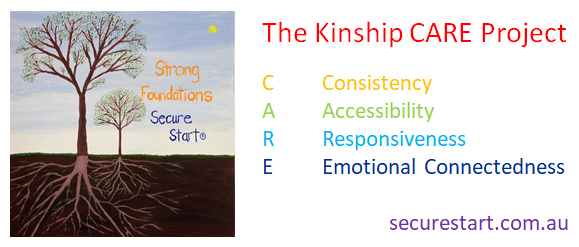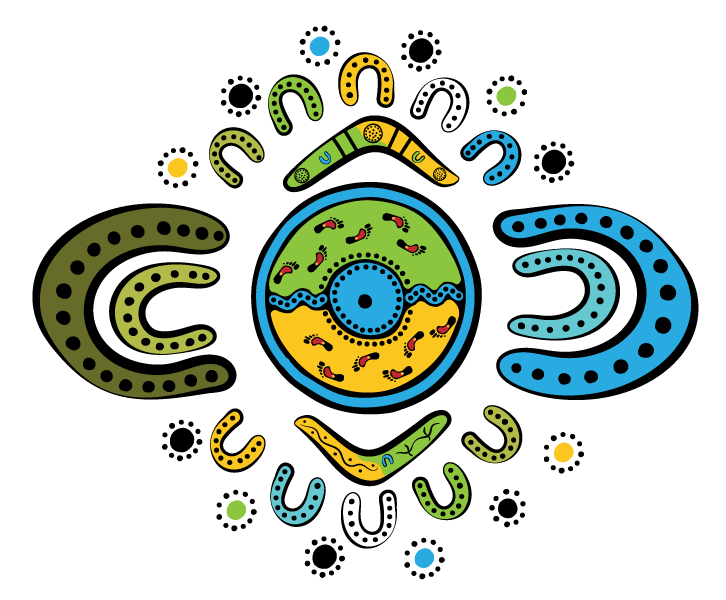The Kinship CARE Curriculum represents an evidence-informed curriculum based in psychological science. The Kinship CARE Curriculum incorporates a strengths-based approach that draws participants’ attention to conventional aspects of caregiving and relating that support optimal developmental outcomes and recovery for children who have experienced early adversity, and the evidential basis for them. The Kinship CARE Curriculum is also a practice-framework, whereby it offers a framework for the delivery of accountable support services that promote carer fidelity to the curriculum and optimal outcomes for children.
The Kinship CARE Curriculum does not seek to replace other approaches to trauma-informed, therapeutic re-parenting of children, and support for their carers. Rather, the Curriculum offers a back-to-basics approach that forms a solid foundation to build on. As a strengths-based approach, the Kinship CARE Curriculum complements other strengths-based approaches.
In the Kinship CARE Curriculum there is a focus on supporting carers to develop an understanding of how to implement a therapeutic re-parenting approach in their own individual circumstances. That is, there is a focus on assisting carers to know what to do, and to develop a tailored therapeutic re-parenting Plan. Psychological theory is presented sparingly and only in support of the rationale (and evidential basis) for recommended approaches. Accessibility of the content is supported through a multi-modal approach to delivery that includes practical activities, demonstrations and audio-visual content in support of verbal content. Regular individual and group reflections also support the accessibility of the curriculum and translation of knowledge into practice. Professionals are encouraged to attend with kinship carers they are supporting, further enhancing carer accessibility to the content and shared understanding of the curriculum.
Central to the Kinship CARE Curriculum is the development of knowledge and understanding of the reasons why people behave in the manner that they do and competencies that support these reasons being addressed. This is central to addressing one of the main casualties of early adversity – namely, the experience of having one’s needs met reliably and predictably that is the foundation for secure dependency and optimal developmental and interpersonal outcomes. The Kinship CARE Curriculum endeavours to promote addressing needs as a fundamental caregiving priority, as opposed to simply addressing behaviour(s) of concern in isolation of needs.
The Kinship CARE Curriculum promotes human Connection as a primary task, where the primary task is defined as the one task that we need to get right and upon which the success of all endeavour rests. There is a robust and ever-growing evidence base for the role of connection in supporting optimal emotional and behavioural outcomes for young people and adults alike.
The Kinship CARE Curriculum utilises the Triple-A Model[1] to support a better understanding of children who have experienced early adversity. The Kinship CARE Curriculum is drawn from the Triple-A Model of Therapeutic Care[2], a comprehensive approach to trauma-informed re-parenting of children recovering from a tough start to life that is in its fourth year of implementation in the TUSLA (Child and Family Agency) fostering service in Donegal.
Related Work – Kinship CARE Project

Phase One of The Kinship CARE Project was implemented successfully with statutory kinship carers in South Australia over a two year period, between March 2018 and March 2020. The Kinship CARE Project was a joint initiative of the Department for Child Protection (DCP) and Secure Start®. The Kinship CARE Project training was delivered to 24 groups of kinship carers in 17 metropolitan and 7 regional locations in South Australia.
In the Kinship CARE Project there is complementary training for kinship care support workers and psychology staff. The content and delivery is similar to that which is delivered to kinship carers, except that there is a focus on the implementation of the Kinship CARE Curriculum in kinship care support workers’ practice with kinship carers, and psychologists’ practice with kinship care support workers. That is, there is a layered approach to implementation, whereby kinship carers experience CARE from their support workers, and support workers experience CARE from psychologists trained in the Framework. Implementation is layered in this way to support fidelity to the framework and embeddedness.

From 2021 the second phase of implementation of the Kinship CARE Curriculum is happening through Martinthi – a collaboration of InComPro Aboriginal Association, Bookyana Cultural and Community Services, and Uniting Care Wesley Bowden (UCWB).
Related Work – The Triple-A Model of Therapeutic Care

The Triple-A Model of Therapeutic Care. Triple-A was developed for a foster care audience. It was initially implemented as the preferred Model of Care in the Centacare Intensive Family Preservation Foster Care Program in South Australia in 2014/15. Across the past four years the Triple-A Model of Therapeutic Care has been implemented as the preferred Model of Care in the TUSLA (Child and Family Agency) Fostering Service in Donegal, Ireland. In September 2018 twelve local trainers, including 6 members of the TUSLA Fostering Service and 6 local foster carers, were trained as local trainers in the Triple-A Model of Therapeutic Care.
The implementation of the Triple-A Model of Therapeutic Care in Donegal has been a great success, with successive reports (2016, 2018) by the independent statutory inspection authority for health and social care services in Ireland (HIQA) reporting positively on the Triple-A implementation. A Training Needs Analysis by the TUSLA Fostering Service in early 2018 reflected that the Triple-A Model of Therapeutic Care was the most mentioned training when general and relative foster carers were asked about useful training they had received, including by a factor of 10:1 over the better-known international approach Therapeutic Crisis Intervention (TCI).
Kinship CARE Curriculum Content:
- What is therapeutic care and what does it require of you?
- The importance of achieving connection as a primary task.
- Enriching children’s experience of caregiver consistency and accessibility
- Enriching children’s experience of caregiver responsiveness.
- Enriching children’s experience of caregiver emotional connectedness.
- Addressing behaviours of concern using the Kinship CARE Curriculum
- Self-Care
Anticipated Outcomes:
- A common knowledge, language and approach among kinship carers and professionals who support them;
- Competencies in trauma-informed, therapeutic re-parenting of children in kinship care, and competencies among professionals in the implementation of a practice framework that supports fidelity to the therapeutic re-parenting approach;
- Competencies in self-care;
- Empowerment and self-efficacy in the respective roles of participants of the program; and
- Improved connections between children and their carers, and between kinship carers and professionals who work with them in a support role.
For more information, contact us:
[1] Pearce, C.M. (2010). An Integration of Theory, Science and Reflective Clinical Practice in the Care and Management of Attachment-Disordered Children – A Triple A Approach. Educational and Child Psychology (Special Issue on Attachment), 27 (3): 73-86
[2] Pearce, C & Gibson, J (2016), A Preliminary Evaluation of the Triple-A Model of Therapeutic Care, Foster, 2, 95-104
